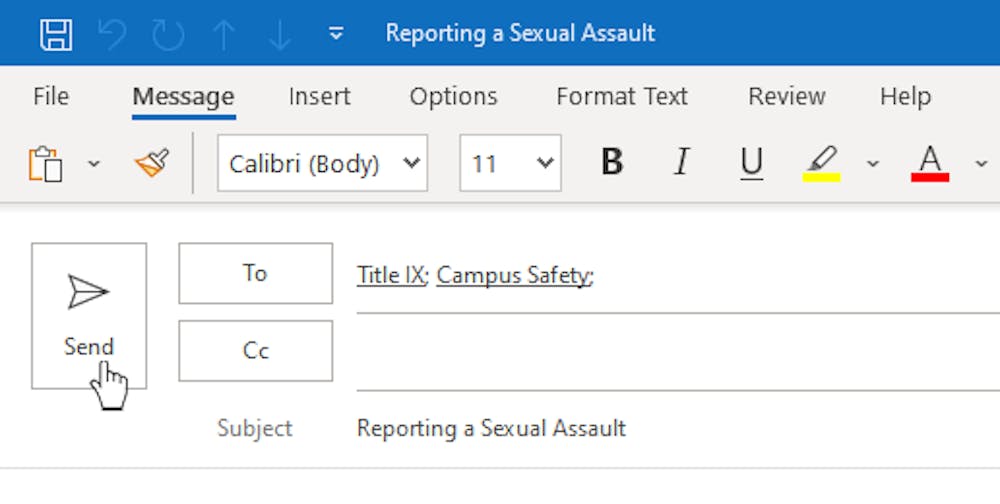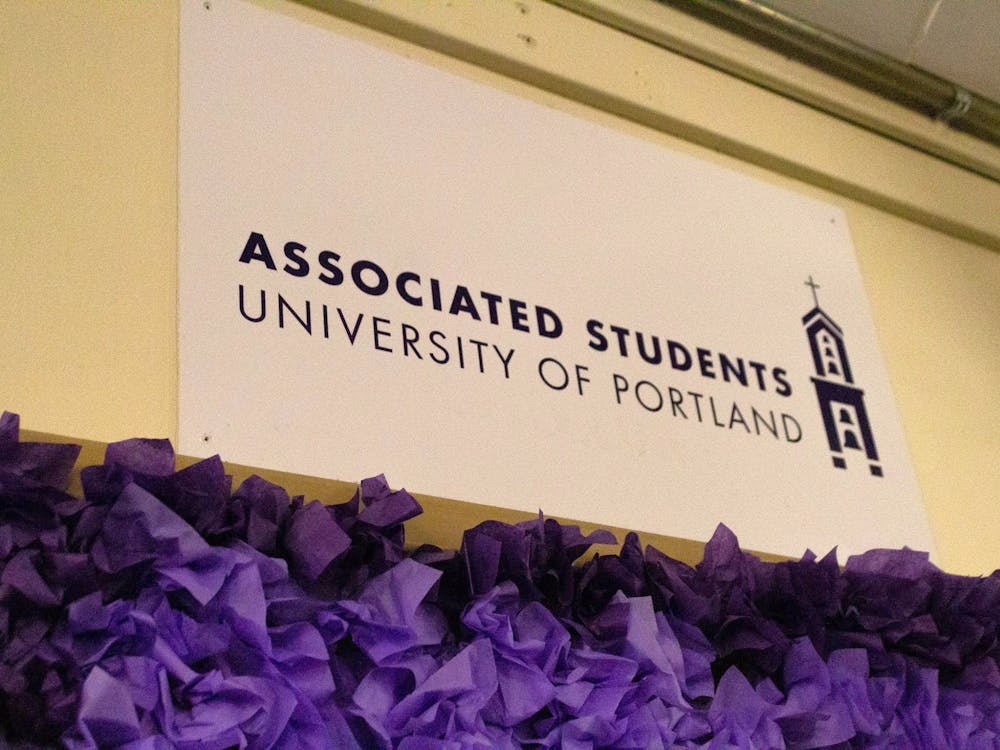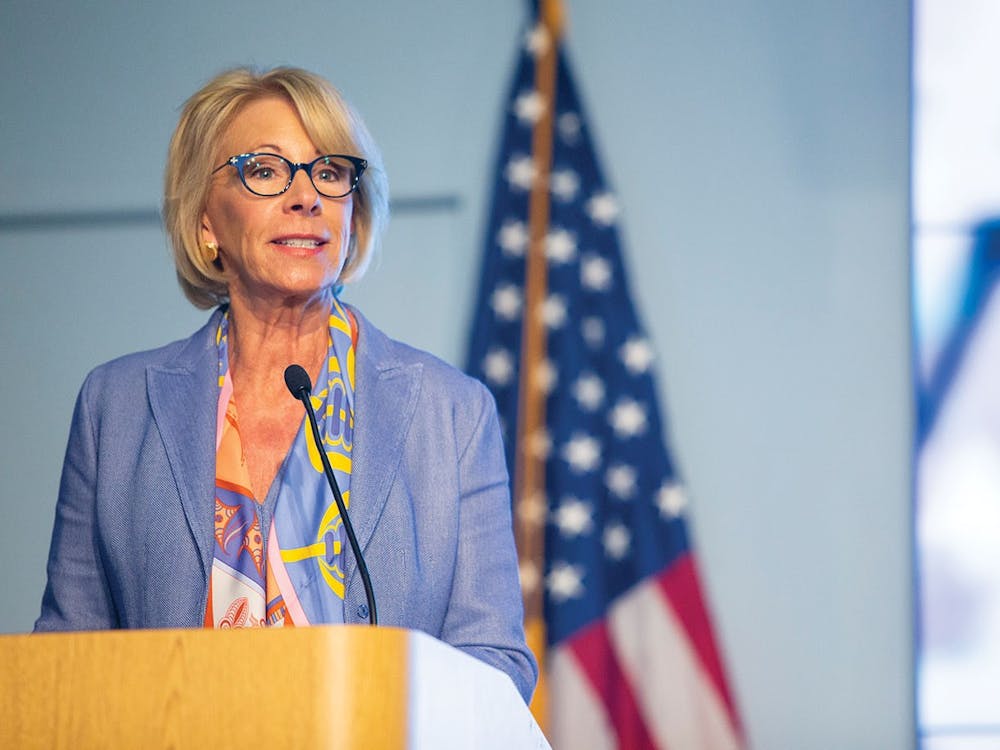A sexual assault was reported to the UP Daily Crime and Fire Log on Oct. 24. It occurred at 1:15 a.m on the 7100 Block of North Fiske Ave.
This was the first and only sexual assault reported on the Crime and Fire Log this academic year. However, that doesn’t mean it was the only one to occur in the UP community. It’s estimated that nearly 80% of sexual assaults go unreported due to a variety of factors, according to a Justice Department analysis.
Sara Westbrook, director of Campus Safety, recognizes the hardships of reporting a sexual assault.
"Maybe that's driven by shame, maybe not.” Westbrook said. “They don't want to be seen or treated differently. But it’s also a life changing event, and I encourage people to come forward.”
At UP, there are many ways to report a sexual assault.
Reporting a sexual assault
Each method of reporting will reach the Title IX Office unless made through a confidential employee. Confidential employees are not required to report to Title IX. Campus Ministry, pastoral residents, Health and Counseling Center (HCC) counselors and staff are confidential employees.

Flowchart detailing what happens when a sexual assault is reported on the UP website.
Screenshot by William Seekamp.
A student may contact Campus Safety for immediate attention or to report a past instance of harassment, misconduct or violence. Campus Safety will work with a student to create a personal statement in these cases, and inform the student that Campus Safety is a mandatory reporter to Title IX. Reports to Campus Safety will be added to the UP Daily Crime and Fire Log and then directed to Title IX.
Students can also come into contact with Title IX through responsible employees at UP. Employees at the Residence Life Office, Student Conduct Office, Campus Safety Office, as well as most administrative, athletic, supervisory, faculty and staff are considered responsible employees if they are not specifically designated as confidential employees.
Also, students may report to Title IX directly on their website, through email at titleix@up.edu, through a phone call to 503-943-8982 or in person at Waldschmidt Hall room 502.
Interim Title IX Co-Coordinator for Student Support, Meg Farra, will be the first to respond to reports during the Title IX process.
Students do not need to report to Title IX by a certain time. The Title IX Office offers support to students who have been impacted at any time.
“So even if someone initially says they don't need the support, they could come back two years later and say, I need support now,” Farra said. “There's no time limit to when we help students.”
What to expect after reporting
Once a report has been submitted to the Title IX office, Farra will reach out to students, typically by email. Each student is invited to meet with her to discuss options and accommodations — however the choice to meet is entirely the student’s decision.
“A student always has the choice not to participate with the Title IX office,” Farra said. “We want to make sure we're supporting people through what might be the most difficult time of their life and we're doing so in a very private and careful manner, so that we are sensitive to what they may be experiencing but realizing that this is extremely impactful to them.”
The Title IX process offers students options, outlined in their “You Have Choices” document, that explains what a student can choose, or choose not to do. This includes resources like support, legal assistance and accommodations.
Only in cases where an immediate danger is presented to the UP community, Title IX will hold an investigation regardless of a student’s decision. These situations include a threat to the safety of the student involved or other UP community members.
Options for students and resources suggested by Title IX
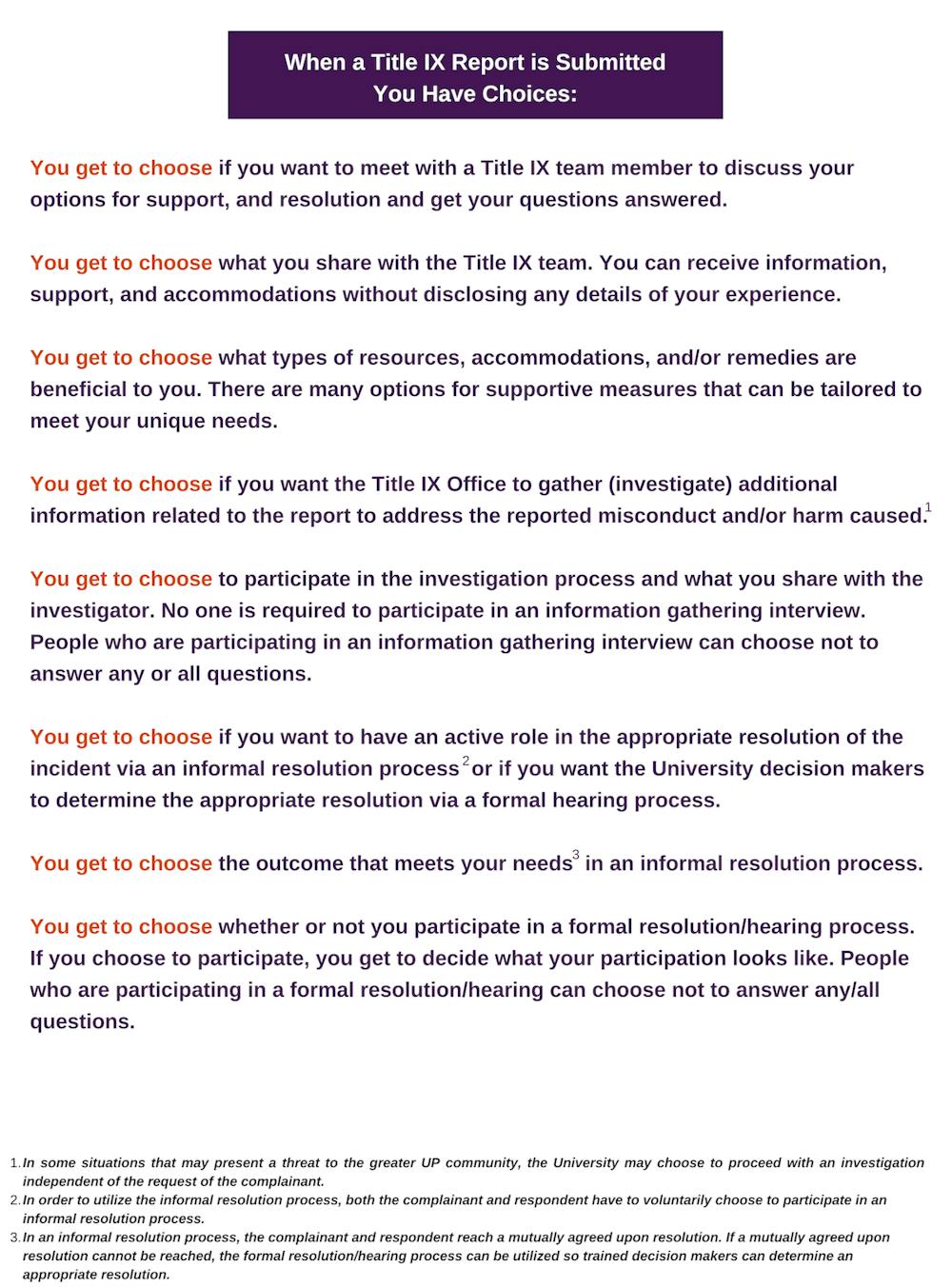
"You Have Choices" page on the UP website.
Screenshot by William Seekamp.
Pursue an investigation:
The first choice a student has is whether they want to move forward with the UP Conduct Process or not. This process requires an investigation. Once an investigation begins, a no contact order is placed between both parties.
In cases where a staff or faculty member is involved, these investigations are mandatory as part of the Business Code of Conduct.
An investigation includes an off-campus investigator who collects evidence and statements, interviews all parties involved, documents information and submits a report to the Title IX Coordinator. Investigations are generally completed within 60 days.
Once a report reaches the Title IX coordinator, there can be formal or informal resolutions. At any point, an investigation may also come to a halt without evidence.
“You can reach the same outcomes through informal resolution,” Farra said. “It’s like a mediated process.”
If a formal resolution is necessary, then the case will go through the Student Conduct Process.
“Our Student Code of Conduct, Life on the Bluff, outlines the various prohibited conduct within what we refer to as Title IX.” Farra said. “So Title IX is actually a shortened version of what we refer to as our Sexual and Gender-Based Harassment, Misconduct and Violence policy.”
Conduct hearings can fall into different categories depending on severity. A Standard Conduct Hearing is designed for discussion of resolution that does not include suspension or dismissal. A Formal Conduct Hearing is specifically for cases that could result in suspension or dismissal.
“A panel of impartial people, so people not connected to either party involved, would weigh the evidence from the report, ask additional questions and determine if it looks more likely or not that the Student Code of Conduct was violated.” Farra said.
The panel consists of three chosen UP staff members who have been trained as Title IX hearing panelists. The members will determine the result based on the preponderance of evidence standard — whether it is more likely than not that the event occurred.
After the hearing, appropriate sanctions are placed. Both parties also have the right to request an appeal.
“And at every step in this process, there are meetings with the student to understand what's coming next,” Farra said. “All of that information is laid out to students along the way so that they always have an opportunity to ask questions and understand what's coming.”
Report to the Portland Police Bureau:
With any reported sexual assault, a student can choose to report to the Portland Police Bureau. Title IX offers support, guidance and information for students in these cases.
In cases where the accused is not a member of the UP community, a UP investigation cannot be effectively pursued, so legal action may be more appropriate.
“Someone who's not part of our process probably wouldn't show up for an investigation or a hearing,” Farra said. “The only thing in that particular situation we could do is no trespass the person. We would want to do that from the onset, so that our campus, and of course that individual, felt safer. We might try to share with a student though what other processes they could engage in. For example, if that person were a student at another school, that school could participate in an investigation of that student's conduct of their own student policies.”
Take no action:
In cases where a student only wants to report to Title IX, they are not required to participate in any more of the reports process. They are offered support and resources, but there is no requirement to pursue any legal or investigative avenues, unless there is a threat to the greater UP community.
Health services:
Title IX can direct students to mental health and medical services, both on and off-campus. These include emotional, mental health and general counseling support.
The Health and Counseling Center at UP offers primary care and counseling services by appointment.
Accommodations:
Title IX also works diligently to provide many possible accommodations for students affected by a report. Academic and non-academic accommodations can be arranged for any student. Academic accommodations can include schedule changes, modified class requirements or other adjustments.
“We know that [a Title IX situation] is going to impact students in every aspect of their life, and so one of those areas that we can help is with our academic accommodations,” Farra said. “We work with the associate deans very privately to tailor and individualize what a student might need to feel like they can continue to be successful at school.”
Non-academic accommodations can include changing work schedules, moving students on-campus, or between dorms, all at no cost to the student while they are in an unsafe environment.
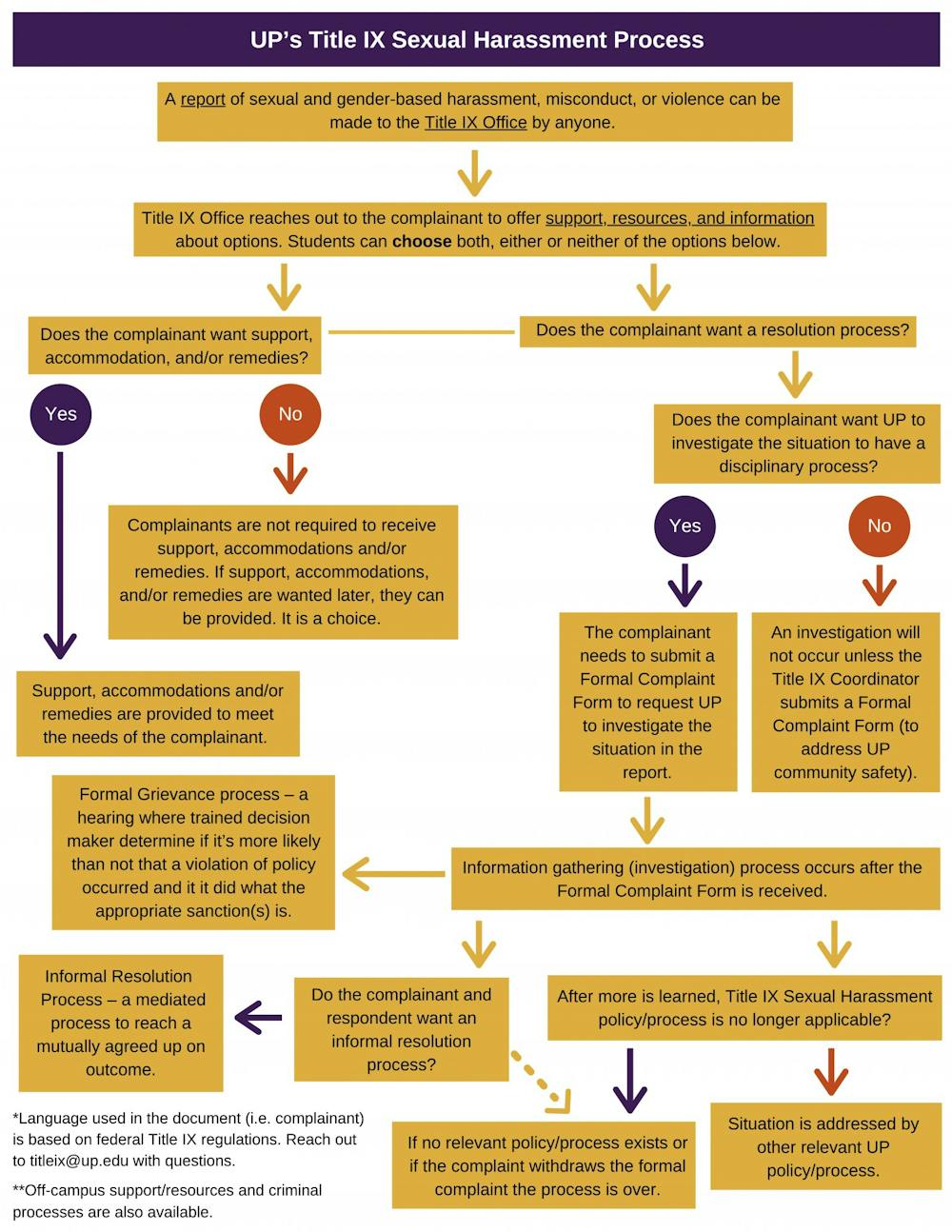
Flowchart showing UP Title IX sexual harassment process listed on UP's website.
Screenshot by William Seekamp.
The Students Against Sexual Assault
The Students Against Sexual Assault club (SASA) is a student-led resource on campus for students affected by sexual assault. They have three main purposes:
“The first purpose is to emphasize the importance of education, prevention, and recovery of sexual violence on University of Portland’s campus… The second purpose of SASA is to believe, support, and provide a safe, brave space for survivors of sexual violence, those affected by sexual violence, and allies to the cause of eliminating sexual violence on our campus… The final purpose of SASA is to inform the students of UP on what sexual assault is/can be and how to be an active bystander inciting change in our community,” according to the SASA constitution.
After recently transitioning from an organization in the HCC to a UP club in February 2021, SASA has been vocal about their calls to action for better resources on campus for survivors of sexual assault.
According to SASA Co-President Maggie Blommer, some sexual assault survivors at UP have felt re-traumatized going through the Title IX process.
“And that's a big reason that we're pushing for a third party confidential advocate on campus, because sometimes survivors just want to go and be heard. They don't necessarily want to take legal action,” Bloomer said.
SASA has pointed out the success of having a third party confidential advocate on other campuses, like Gonzaga University.
According to Farra, a group of students including members of SASA, faculty and staff have submitted a funding request for a third party confidential advocate that the UP’s Budget Working Group (BWG) will consider in February, along with all other budget requests from across the university..
SASA also recommends many off-campus resources to students who have been affected by sexual assault:
Rape, Abuse & Incest National Network (RAINN)
National Sexual Violence Resource Center
Sexual Assault Resource Center Oregon
Centers of Disease Control and Prevention, Sexual violence
National Sexual Assault Hotline (24/7): 1-800-656-4673
Tammy Herdener, Associate Vice President for Student Development and Deputy Title IX Coordinator for Education, works closely with SASA in addressing their concerns on campus.
“We're really grateful for SASA,” Herdener said. “The Title IX team, and the campus as a whole really align with SASA’s message and goal of preventing sexual violence. And we're working on getting a closer collaborative relationship with them, because we are all working towards the same goal.”
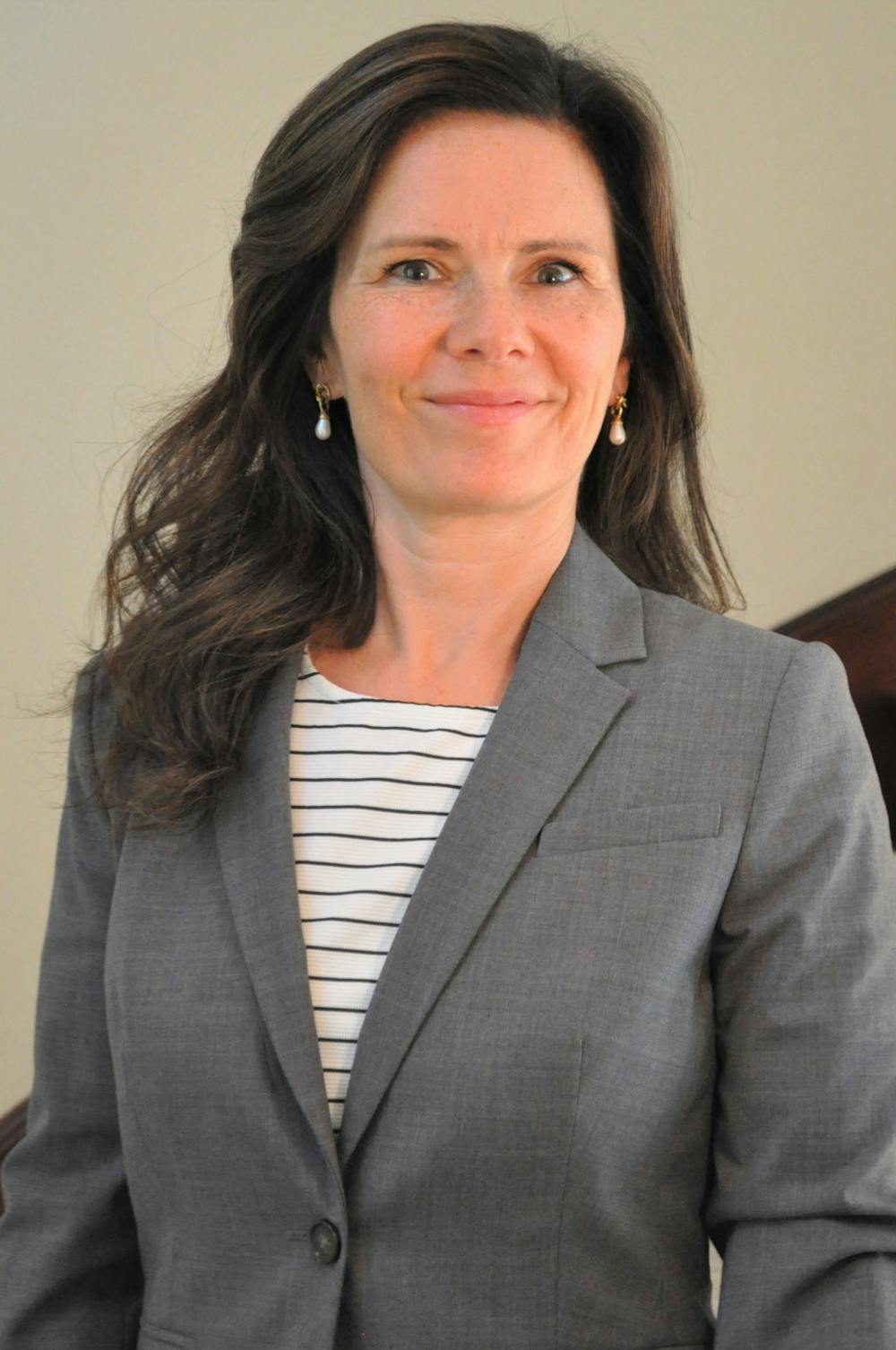
Tammy Herdener, Associate Vice President for Student Development and Deputy Title IX Coordinator for Education, works closely with SASA in addressing their concerns on campus.
Photo courtesy of the UP Office of Public Affairs.
Between all the people at UP working to prevent cases of sexual assault, it is important to focus on helping students who have been affected. This academic year, Title IX has already been busy working with plenty of students.
“This year alone we’re had about 150 students that we’ve worked with in various capacities,” Farra said. “That includes people who are reporting what occurred to them, people who are impacted because they may have seen what occurred, people who are being alleged, or people who engaged in some activity that is against our Student Code of Conduct.”
Title IX hopes to create an environment where students and community members feel safe and respected.
“We want to try to help,” Farra said. “I would just want people to come forward and understand that we are here to help them. We care about their safety and their physical, emotional, spiritual well being. We care about it all and want to find out where that student is and help them.”
Chiara Profenna is a reporter for The Beacon. She can be reached at profenna23@up.edu.



